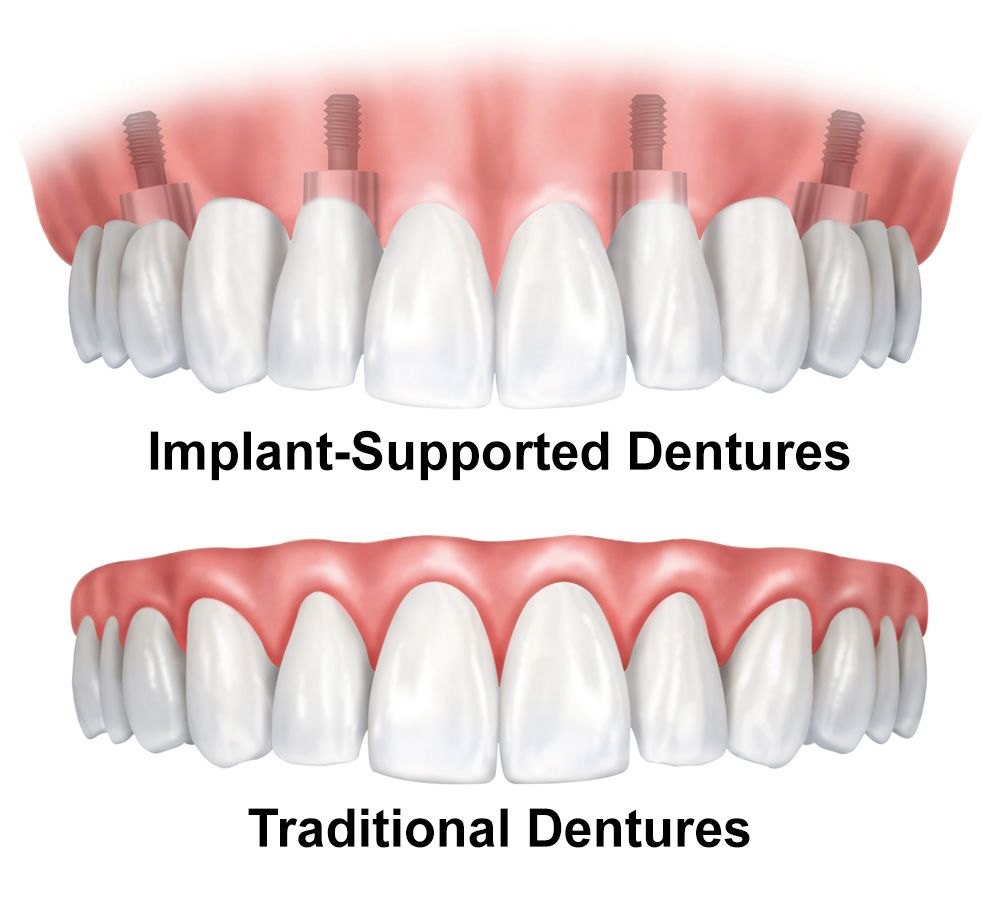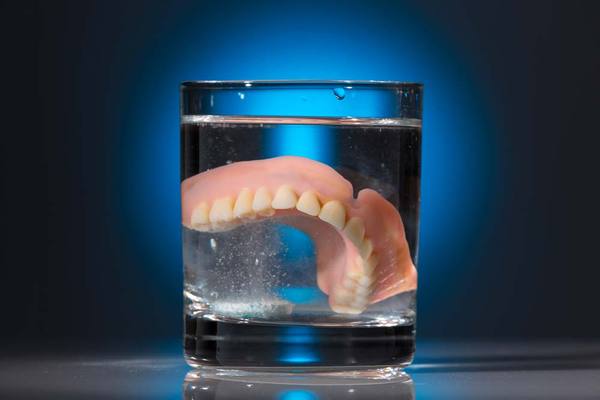Dentures
Widespread tooth loss can make you feel self-conscious about smiling in public and interfere with nearly every aspect of your life.
At Advanced Dentistry of Blakeney, we offer several types of traditional and implant-supported dentures to fully rebuild your smile.
So why should you consider dentures?
Look Better and Feel Better
Rejuvenate Your Appearance
Missing teeth can cause sunken cheeks and puckered lips, making you appear older than you feel. Dr. John M. Pinnix and Dr. George A. Betancourt offer custom dentures which can take years off your appearance.
Enhance Your Quality of Life
Dentures, especially when supported by dental implants, can restore your ability to speak clearly and eat comfortably. You can also feel more confident about smiling in public.
Benefit from Advanced Stability
At Advanced Dentistry of Blakeney, we can place dental implants and restore your smile with a custom denture. Implants keep your dentures securely in place and help prevent other oral health issues, such as jawbone recession.
Take a look at how an implant-supported denture works...
Tooth Loss Is
a Common Issue for Older Adults

*According to the Centers for Disease Control and Prevention
How have dentures evolved in recent years?
MODERN DENTURES OFFER A REMARKABLY LIFELIKE FIT AND APPEARANCE
With our advanced treatment options and attention to detail, our prosthetics are far more comfortable and realistic than you may have ever thought possible. We provide both removable full and partial dentures, which will fit securely around your gums and last for years with proper care. Alternatively, Dr. John M. Pinnix, or Dr. George A. Betancourt also offer implant-supported dentures. Attached to permanent implant posts, this type of prosthetic will remain firmly fixed in your mouth, helping to prevent bone recession.
Are You a Candidate for Traditional Dentures?
If you are missing all or most of your teeth or have recently undergone full mouth extraction, you are a candidate for full dentures. If you have large gaps in your smile but still have some healthy teeth, partial dentures or a dental bridge may be right for you.
We provide our patients with natural-looking, customized dentures designed to restore oral function and the aesthetics of your smile.
After determining whether you need full or partial dentures, you and your dentist will work together to select the best type of restoration for you. A traditional denture is removable, and may be suitable if you are watching your budget or are not ready to commit to a permanent prosthetic.
Are Implant-Supported Dentures Appropriate for You?
Implant-supported dentures attach to bars, abutments, or snaps that are affixed to titanium posts placed in the jaw and offer incredible stability and durability. An implant-supported denture may be a good option if you are missing all the teeth in your top or bottom dental arch. This type of restoration may also be appropriate if you have significant dental damage and you require multiple extractions.
To determine your candidacy for implant-supported dentures, Drs. Pinnix or Betancourt will need to conduct a thorough exam. The most vital consideration is the health of your jawbone. A strong jawbone will provide plenty of support for the implants, ensuring a lasting restoration. Fortunately, even if you have suffered jawbone atrophy, our dentists can often perform a bone graft to replace lost tissue. Alternatively, All-on-4 dentures use smaller posts, so grafting is not always necessary.
Fitting Your Prosthetic
Our team takes a detail-oriented approach to restorative dentistry. Whatever size or type of restoration you choose, your dentist will make sure that it looks and feels realistic.
Receiving a Traditional Denture
If you opt for a removable denture, your dentist will take impressions of your gums, then send these molds, along with photos of any remaining teeth, to our partner lab. Technicians will create a prosthetic with tiny metal clips that connect to remaining teeth and a plastic base that will fit around your alveolar ridge. The plastic base will match the color of your gums.

The Treatment Process for Implant-Supported Dentures
Implant surgery will take place under local anesthesia and some form of deeper sedation. Before beginning the process, your dentist can help you determine whether nitrous oxide, oral conscious sedation, IV (intravenous) sedation, or general anesthesia best suits your needs. Once you are comfortable, your doctor can place the implant posts with minimal discomfort.
Drs. Pinnix or Betancourt will place between two and six implants. The exact number will depend on the size and type of your restoration. If you choose a full implant-supported denture, your dentist will typically use the All-on-4® method, placing four small dental implants at a slight tilt to provide a strong base for your prosthetic with minimal impact to your jaw. A partial denture will require two or more posts, depending on the size of the restoration. After your jaw heals, your dentist will attach your denture to the implants.
An implant-supported denture may be a good option if you are missing all the teeth in your top or bottom dental arch. This type of restoration may also be appropriate if you have significant dental damage and you require multiple extractions.
These posts will be set in small pilot holes that your dentist can create through tiny incisions in your gums. For traditional dental implants, the healing period takes approximately four to six months while your bone tissue fuses with the implant posts. In some cases, you may need to wear a temporary removable denture during this time. Alternatively, if you qualify for All-on-4 implants, your dentist can attach a custom-crafted restoration on the same day as your surgery.
Once you have fully healed, you can return to the office for the next step in the procedure. If you are going to receive a standard implant-supported denture, your dentist will need to perform a second surgery that removes any gum tissue that has grown over the implant posts. Once this is complete, he can attach your restoration. It could be permanently fixed in place, or you may opt for a fixed hybrid prosthesis. This second option is just as stable but also offers the benefits of a removable restoration. Even if you receive an All-on-4 implants, your dentist will take off the original prosthetic and attach the final restoration at this time.
The Benefits of Removable and Permanent Dentures
All of our dentures can have tremendous and lasting benefits. Your prosthetic will renew your ability to eat and speak clearly. Your denture will also improve your appearance, replacing missing teeth and filling out your lips and cheeks.
Just as there are many benefits to receiving dental implants, there are a number of reasons to choose custom a implant-supported dentures over a removable one:
- These restorations offer unparalleled stability. You will typically be able to enjoy an unrestricted diet. Your denture will never slip around in your mouth, allowing you to eat and smile with confidence.
- Implant-supported dentures look more realistic than standard dentures because they do not have a plastic base. Instead, they sit right against the gums and attach to dental implants with a ball-and-socket connector. In addition, we meticulously design our restorations and use the latest materials to craft an incredibly natural-looking prosthetic.
- Dental implants replace missing tooth roots. Like natural roots, they will emit regenerative signals, which will stop jawbone recession. Implants are the only type of restoration to perform this important function.
Tips for Cleaning & Maintenance
Dentures are strong, resilient, and made to last. However, they require proper maintenance and care for long-term success. In general, you can care for implant-supported dentures as if they were your natural teeth. Traditional dentures require additional care.
Our doctors have a few recommendations to help keep your removable appliance looking and feeling great:
- Rinse after eating: After every meal, remove your dentures and rinse them thoroughly to eliminate food particles and debris. This will help keep your mouth free from harmful bacteria.
- Handle with care: When you remove your dentures, we recommend placing a towel on the countertop or in the sink. This will protect your appliance should you accidentally drop it. Clean your dentures gently to avoid bending any metal or plastic clasps.
- Clean your mouth: Caring for your gums and any remaining teeth is just as important as keeping your appliance clean. When you remove your denture, clean your gums, inside of your cheeks, tongue, and the roof of your mouth with a soft-bristled toothbrush or piece of gauze. Be sure to clean any residual denture adhesive off of the appliance so it does not irritate your delicate soft tissues.
- Brush your appliance daily: Your dentures should be thoroughly brushed at least once a day. To do so, use a nonabrasive denture cleanser and a soft brush to sweep away plaque, food deposits, and other debris. If you use adhesive, be sure to remove any residue from your prosthesis.

Dentures should be soaked overnight to avoid warping.
- Soak your dentures overnight: There are several denture-soaking solutions on the market. These can keep your dentures looking and feeling fresh. If you prefer not to use a soaking solution, you should place your dentures in a glass of water. Keeping your appliance moist is essential for keeping its shape and avoiding warping.
- Rinse before wearing: In the morning, be sure to thoroughly rinse your appliance after removing it from the denture-soaking solution.
- Attend routine checkups: Regular dental examinations are absolutely crucial for denture-wearers. During these visits, Dr. Pinnix or Dr. Betancourt can assess your appliance to ensure it is still working properly and fitting well. It is normal to require occasional relines and adjustments. As the underlying bone changes shape over time, your denture may become loose or wobbly. Should this occur, simply schedule an appointment with your dentist.
Regular dental examinations are absolutely crucial for denture-wearers. During these visits, your doctor can assess your appliance to ensure it is still working properly and fitting well.
Products & Activities to Avoid
When it comes to caring for any type of dentures, there are a few things to avoid as well. These include:
- Whitening toothpaste: These products are too abrasive to be used on dentures and can cause tiny scratches in the surface of your appliance. Additionally, there is nothing in whitening toothpastes that can brighten the color of prosthetic teeth.
- Products with bleach: Using bleach on your dentures can weaken the structure of your appliance and corrode any metal clasps. In addition, these products can discolor your appliance.
- Abrasive cleansers: You should always avoid using hard-bristled brushes and harsh cleaning materials, as these can damage your appliance.
- Hot water: Extreme temperatures can distort your dentures. Therefore, you should avoid placing them in hot water, and be sure to store them properly when not in use.


